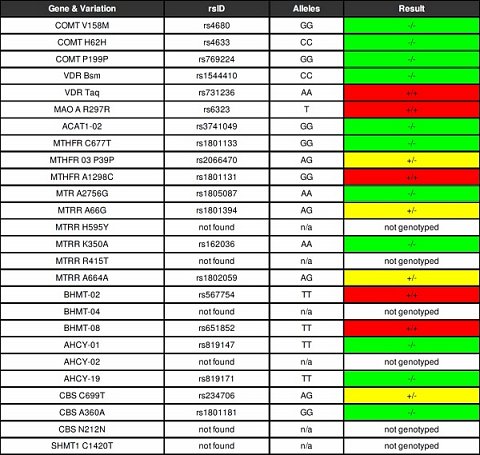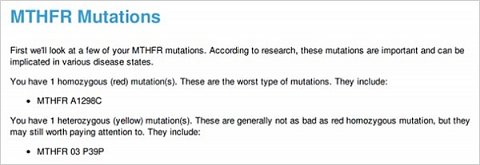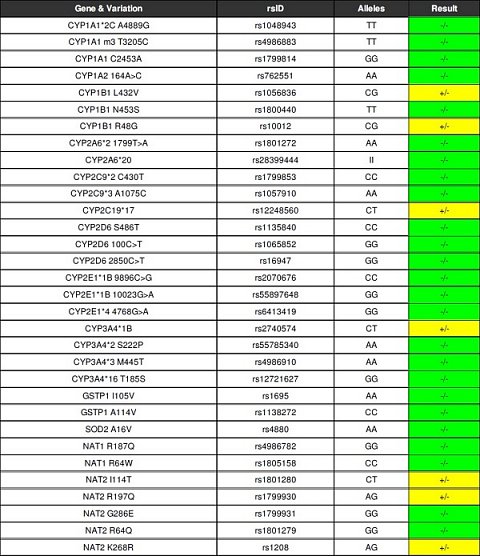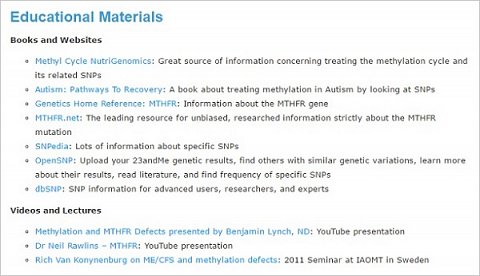-
Methylation Analysis and Detox Profile
review on 16 September 2016
by Craig Macpherson

At a Glance
Summary
Genetic Genie’s analysis of my 23andMe data provided me with new and interesting information about my health, as well as the opportunity to independently explore my genetic data. Although scientific knowledge was required to fully understand the results, the information was detailed and informative. Particularly useful were the ‘rsIDs’, which allowed me to look up information specific to the genetic variants I possessed. The amount of detail provided about each gene was all the more impressive when you consider that this tool is free.
Unfortunately, despite the clear scientific basis for the analysis, very little information was provided in the report to help me understand or address the symptoms predicted by the results.
The resource links were particularly helpful for further research, as were the frank assessments of the studies that backed the conclusions made. This service might not be for everyone, but I would definitely recommend the tool to someone who is interested in truly understanding their DNA test results and the science behind them.
Full Review
Genetic Genie was offering a type of health analysis that isn’t commonly included in either DNA testing packages or raw data analysis tools. Its service is centred around the idea of ‘epigenetics’, specifically in relation to something known as the ‘methylation cycle’. Before using this tool, I had a basic knowledge of epigenetics, which is the idea that although our genes stay the same, the level at which they are expressed can vary depending on a variety of factors. However, I knew nothing about the details of the methylation cycle, or its potential impact on genes (and subsequently health) so I was interested to find out what insights this analysis might provide.
Product Expectations
The Genetic Genie homepage provided a pretty good idea of what to expect from its tools. There were summaries for both the ‘Methylation Analysis’ and the ‘Detox Profile’ tools, outlining what each was about. This included what health aspects the genetic variants analysed were generally associated with. It was also made clear that I needed to use the raw data from the 23andMe test I’ve taken to use the service. Brief instructions on how the test itself would work were included, though it’s worth pointing out that Genetic Genie is in no way promoted or endorsed by 23andMe and doesn’t sell the test on its site.
Another useful part of the Genetic Genie homepage was the rolling list of blog posts at the top. This provided background to the information provided in the summaries and several posts included diagrams of the methylation cycle, as well as explanations about why Genetic Genie provides their service. From these blog posts, but also from some supplementary internet research, I managed to work out that the Methylation Analysis would show me whether my DNA contained any genetic variants that affected the enzymes involved in methylation of DNA, which can affect the activity of genes. Changes or defects in DNA methylation have been associated with a wide range of conditions, from general behaviour to cancer, but it is still a relatively small area of genetic research. It seemed that the point of this report was to show whether my DNA contained any of these genetic variants, which would allow me to supplement my diet with vitamins, that research has suggested can alter methylation, in order to improve my overall health.
In terms of the Detox Profile, I worked out that the genes analysed were those associated with enzymes involved in detoxification of drugs and other chemicals in your liver. Again this could identify any which may result in a less active enzyme, which could potentially then be aided by supplementary vitamins. Suggestions of where to buy these vitamins were listed on the ‘Resources’ page.
Although it was clear that the tools offered by Genetic Genie, with all features included, were free, there were areas which were designed to encourage donations. Fortunately, these were not too numerous or placed in a way that made me feel pressured into donating, and the accompanying message was friendly rather than ‘salesy’.
Finally, and importantly, it was made clear that the report was intended for interest only and did not constitute medical advice or diagnoses.
Upload Experience
Uploading my data to Genetic Genie was really quick and simple. I didn’t need to sign up to the site to get my report, which meant the results were almost instantly provided. I was given the option to either upload directly from 23andMe or to upload a saved version of the data from my computer. I chose the latter option, but I’m sure the process would have gone just as smoothly had I chosen the other option.
On the same page, an FAQ-style section explained that my data was only on the server for seconds, with no way of identifying it as mine. I therefore had no worries about the security of my personal data, or about the company passing it on or storing it. The lack of an account did become less helpful when researching my results, as this system does mean that I had to re-upload my data each time I wanted to view the report. However, there was an option of downloading the report as a PDF, which meant that the only real issue with not having an account was that it wasn’t accessible everywhere, as it would have been from an online account. The lack of an account would also have been inconvenient had it been a more complex upload experience. However, as it was, it took such little effort to upload my data that it wasn’t a big issue.
One other thing to note is that although you need to have taken a 23andMe DNA test to get your personal results from this service, Genetic Genie provide a sample DNA data document that can be downloaded and used to get a sample set of results. This would be really helpful if you simply wanted to become more familiar with genetic variants and genetic analyses, or if you were waiting on the results of a 23andMe test and wanted to get an idea of what to expect with your own data.
The Results
The results section provided me with the Methylation Analysis and Detox Profile reports separately. I decided to first look at the Methylation Analysis, before moving onto the Detox Profile.
Results Section: Methylation Analysis
The results were organised into a table, with four headings: ‘Gene & Variation’, ‘rsID’, ‘Alleles’ and ‘Result’ (shown below). I was a bit confused about what an rsID was, but a quick Google search led me to a 23andMe help page. This explained that rsID stands for ‘Reference SNP cluster ID’ which basically means it is a number used by researchers to enter and find clusters of related genetic variants in databases.
The alleles were detailed as two letters, representing nucleotide bases of DNA (A=adenine, G=guanine, T=thymine, C=cysteine). I thought that these headings were a little confusing for anyone without a good understanding of genetics, but the Gene & Variation and Result columns was easy enough to understand, and could be used without the other two. The results were simply given as either a ‘-/-’ to indicate that no genetic variants were present, ‘+/-’ to indicate that just one variant was present, and ‘+/+’ to show that both variants were present. Colours were also used, with green for -/-, yellow for +/- and red for +/+, which made things even clearer.

My Methylation Analysis.
The results were well explained in a section below the table, with scientific terms such as heterozygous (+/-) and homozygous (-/- and +/+) quickly made understandable. There was an explanation of each gene and what it meant to possess a genetic variant, aka ‘mutation’, of that gene.
Results Section: MTHFR Mutations
The explanation section firstly went through my MTHFR results (shown below), which revealed that in two of the three variations, I had one homozygous mutation (in MTHFR A1298C), and one heterozygous mutation (in MTHFR 03 P39P).

My MTHFR mutations.
There was a lot of information on the homozygous mutation in my MTHFR A1298C gene, which is apparently related to something called BH4. The explanation was thorough, if a little technical for a non-scientific audience, and ended with a clear conclusion that this mutation may lead to mental/emotional and/or physical symptoms. I thought it was a shame that Genetic Genie couldn’t be more specific on this point, or provide information to help me better understand or combat the symptoms they alluded to.
Although this explanation provided too much specialist detail for those who don’t have a knowledge of molecular biology, for those that do, I imagine the extra information would be really interesting.
Unfortunately, there wasn’t any information about the heterozygous mutation in my MTHFR 03 P39P gene because there was not enough data or research to draw conclusions from. Although this was slightly disappointing, it reassured me that the other conclusions were backed up by reliable data and research.
Results Section: Other Mutations
In addition to my MTHFR gene results, there were explanations about the other genetic mutations I possessed. This section firstly listed my four homozygous mutations (in VDR Taq, MAO-A R297R, BHMT-02 and BHMT-08) and three heterozygous mutations (in MTRR A66G, MTRR A664A and CBS C699T) before explaining their significance.
Unlike for my MTHFR results, this information was generalised, rather than specific to the mutation, but was still very detailed. It also included information about all of the genes listed, even the ones which my results showed no mutation for. I appreciated this as it was still interesting to read about. Again, there was a lot of scientific detail, which may not appeal to those looking for simple health results, but there was plenty to encourage further research for those that are interested.
A lot of the descriptions were followed by a notice that explained that the research was mainly clinical rather than published or peer reviewed. There were also disclaimers for various sections such as “very little medical research to support these claims”. Although I would have preferred that there were solid, reliable references backing their conclusions, the fact that this information was included reassured me about the results, as it showed that Genetic Genie were clear and honest about the quality of the research. The comprehensive detail about each gene analysed gave me a solid foundation for further research.
Results Section: Detox Profile
The Detox Profile report (shown below) was similar to the Methylation Analysis in the way in which it was organised. It had the same four columns, with the same headings and the ‘+/-‘ annotations by colour for each result.

My Detox Profile Report.
There were more genes listed for this report, and I had results for all of them, unlike for the Methylation Analysis. The major difference between the Detox Profile and Methylation Analysis was that the Detox Profile had no supplementary explanations about the meaning or significance of each type of genetic result.
This was disappointing, but in Genetic Genie’s defence, there was a sentence at the top of the report which explained that the Detox Profile is designed for those “who have some understanding of Single Nucleotide Polymorphisms (SNPs)” – SNPs being another term for genetic variants. It would perhaps have been helpful to have this notice on the homepage or on the upload page to make it clear straight away that this is the case. That said, the process of getting results was free and so quick that it wasn’t a major issue.
In terms of assessing the usefulness of these results, I decided to use SNPedia. This is a free service that acts as a Wikipedia for genetic variants. I searched, using the rsIDs provided for each gene, and was provided with links to several articles that were related to the relevant cluster of genetic variants. I found a link to SNPedia on a section of the Genetic Genie website dedicated to further resources (shown below), as well as links to two YouTube lectures from experts on methylation.

Educational Materials Links.
Summary
Genetic Genie’s analysis of my 23andMe data provided me with new and interesting information about my health, as well as the opportunity to independently explore my genetic data. Although scientific knowledge was required to fully understand the results, the information was detailed and informative. Particularly useful were the rsIDs, which allowed me to look up information specific to the genetic variants I possessed. The amount of detail provided about each gene was all the more impressive when you consider that this tool is free.
Unfortunately, despite the clear scientific basis for the analysis, very little information was provided in the report to help me understand or address the symptoms predicted by the results.
The resource links were particularly helpful for further research, as were the frank assessments of the studies that backed the conclusions made. This service might not be for everyone, but I would definitely recommend the tool to someone who is interested in truly understanding their DNA test results and the science behind them.
Visit Genetic Genie to learn more about this DNA testing service >


